In this article:
Guava is loaded with essential vitamins, minerals, and antioxidants, which can be best derived when the fruit is consumed raw and fresh.
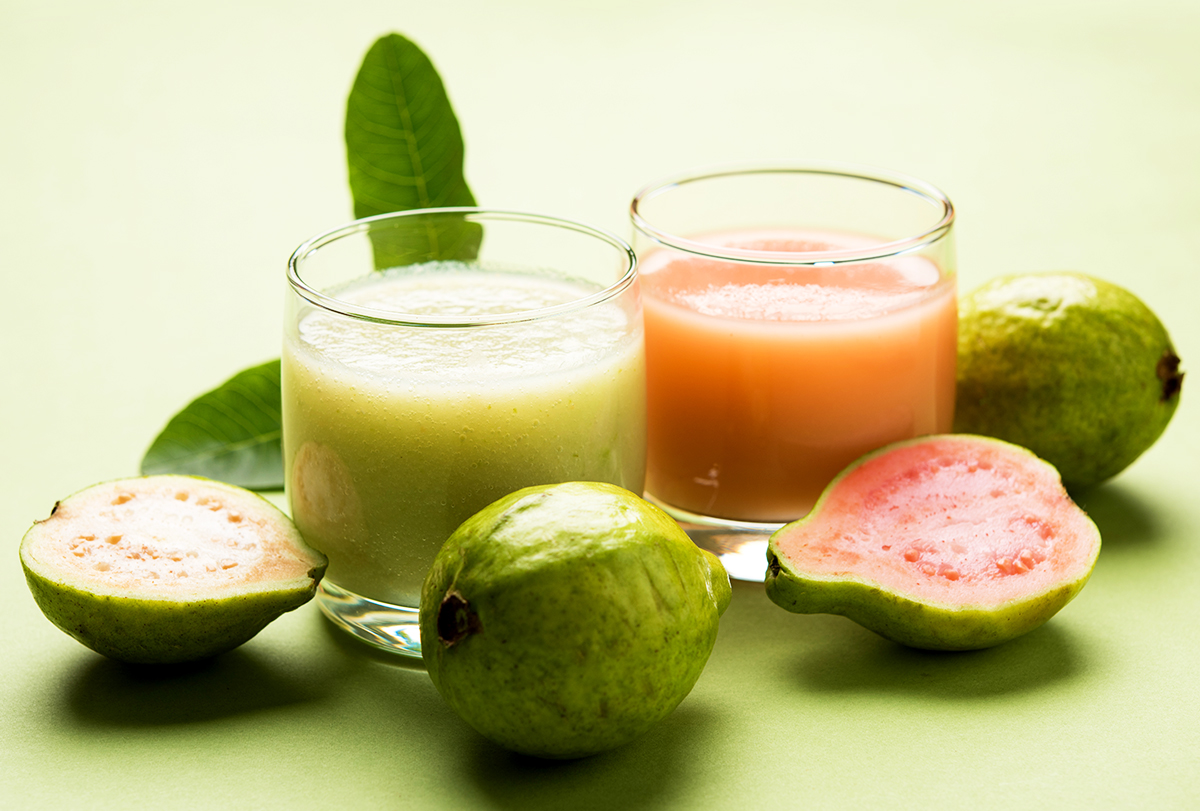
This synergy of nutrients can contribute to lifelong health and protection from disease. Supplements cannot provide the abundance of protective nutrients all wrapped up in a sweet and low-calorie treat quite like guava.
Nutritional Value
Guava is a nutritional powerhouse, full of vitamins, minerals, antioxidants, polyphenols, and flavonoids. One hundred grams of guava can fulfill 14% of your daily fiber requirement without adding to your calorie load.
Most Americans consume less than 50% of the recommended 25–38 g of fiber per day. Guava is a good source of vitamins A and C, copper, folate, iron, B vitamins, potassium, zinc, phosphorus, and antioxidants such as beta carotene and lycopene. (1)
- Calories – 68 kcal
- Fiber – 5.4 g
- Potassium – 417 mg
- Vitamin C – 228 mg
Guava Varieties
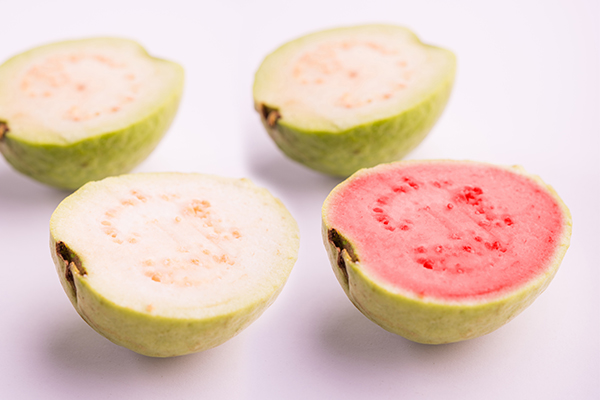
There are many varieties of guava, and they have individual characteristics of flavor, texture, and odor. The two main categories are white and pink/red guavas.
The sweeter red guava has high moisture content and can be used to make jams, desserts, and sauces. The more acidic white guava has a firm texture that makes it suitable for eating sliced or as topping on a salad, breakfast cereal, or yogurt.
Other special varieties include the strawberry guava, which tastes like a strawberry, and lemon guava, which has a flavor that resembles both the lemon and guava.
Health Benefits of Guava
Here’s why you should eat more of guava as part of an overall well-balanced diet:
1. Promotes oral health
Guava leaves have been shown to help fight bacteria, inflammation, and plaque. (2)
A recent study found that daily use of a 0.15% guava leaf extract-based mouthwash was as effective as a standard mouthwash in reducing bacteria, redness, and swelling in people with severe gingivitis. (3)
Emerging research shows promising evidence that guava leaves can help treat and prevent oral health problems when coupled with regular brushing, flossing, and dental checkups.
2. Aids in diabetes management
Guava is full of fiber, which slows the absorption of sugar in the intestines and helps keep blood sugar levels from spiking. Thus, this healthy fruit can be included in the diet of people with diabetes while maintaining blood sugar control. However, diabetics are advised to remove the guava peel since it tends to elevate blood sugar more than the inner flesh. (4)
Also, one research study found that tea made from guava leaf extracts can help prevent blood sugar spikes when ingested with meals. (5)
Although not a replacement for medical treatment, guava can be a natural way to manage blood sugar for people with diabetes or prediabetes.
3. Maintains skin health
Guava is rich in potent antioxidants, including vitamin C, beta carotene, and lycopene.
Vitamin C is essential for the production of collagen, a protein that keeps the skin resilient and healthy. Also, the nutrients in guava may protect against UV-induced skin damage. (6) However, more research is needed to demonstrate its potential for slowing premature skin aging.
With four times the vitamin C content of oranges, guava provides the antioxidant power to help protect your skin from free-radicals, sun damage, and possibly even the aging process.
Other Potential Benefits
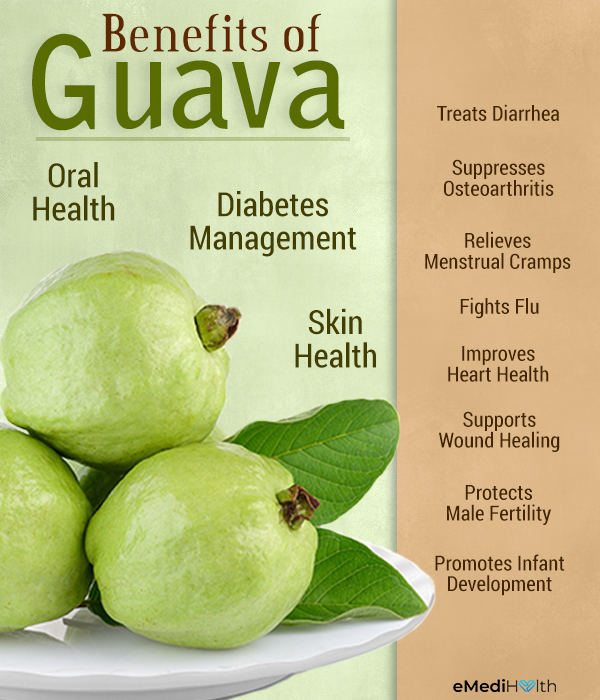
Traditional therapies and emerging research suggest many potential benefits of guava for the treatment of various ailments and diseases. However, the evidence is limited.
Most studies are done on animals; it is yet not known how humans might react to the same treatments. Further investigation is needed to determine the true effect of guava on these various conditions.
1. Treats diarrhea
The antibacterial properties of guava could cleanse the gut of the harmful organisms causing diarrhea. Animal studies show that guava leaf extract may reduce the number of watery stools and abdominal pain. (7)
2. Suppresses osteoarthritis
Free radicals play a role in the development of osteoarthritis. Research in animals suggests that the antioxidants in guava can reduce cartilage destruction. (8)
3. Relieves menstrual cramps
In one study, the women who took 6 mg of guava extract had significantly reduced menstrual pain during the 4-month study period compared with those who took ibuprofen. (9)
4. Fights the flu
The flavanols in guava tea are natural antioxidants that have antiviral effects. Unlike most vaccines, they act on a broad spectrum of viruses and could be used to fight a myriad of emerging flu strains. (10)
5. Lowers risk of cancer
Free radicals are also responsible for cell damage that contributes to cancer. The antioxidants in guava could help prevent cancer and tumor development. (11)
6. Improves heart health
The pink-colored guava fruit contains lycopene, which is associated with reduced risk of cardiovascular disease. There is some evidence that consuming guava fruit and juice without the peel can reduce blood pressure and improve cholesterol. (4)(12)
7. Supports wound healing
Guava seed oil is high in antioxidants and linoleic acid, an unsaturated fat. Linoleic acid is known to play a role in wound healing and blood vessel formation. (13)
8. Protects male fertility
The antioxidants in guava may protect the sperm from natural toxins.
In one study, the rat’s given guava leaf extract had significantly increased sperm counts compared with the rats given placebo after exposure to the natural toxin gossypol. (14)
9. Promotes infant development
Folate is a vitamin that plays a role in the growth of new cells. During the first trimester of pregnancy, critical neural development occurs.
How to Eat Guava
First, wash the guava. Although guava remains one of the least contaminated fruits, it is important to remove any dirt or germs that may be on the outside.
Guava has a sweet yet tart taste with a strong, lemony aroma, making it an ideal ingredient for a variety of saccharine and savory recipes, from pies and jams to meat marinades. However, guava is at its nutritious best when eaten fresh and raw.
These are some of the ways that guava can be enjoyed:
- Eaten whole like an apple or sliced and eaten plain
- Lightly seasoned with lemon juice, salt, sugar, soy sauce, or cayenne pepper
- Boiled and gelled to make candy, jelly, and jam or cooked in pies and cakes
- Added as a topping on salads, breakfast cereal, or yogurt
- Pureed in pudding, syrup, juice, or baby food
- Added to savory sauces such as tomato sauce, marinades, and salsa to impart a sweet-tart touch or can be dried and eaten as a snack
Selection and Storage
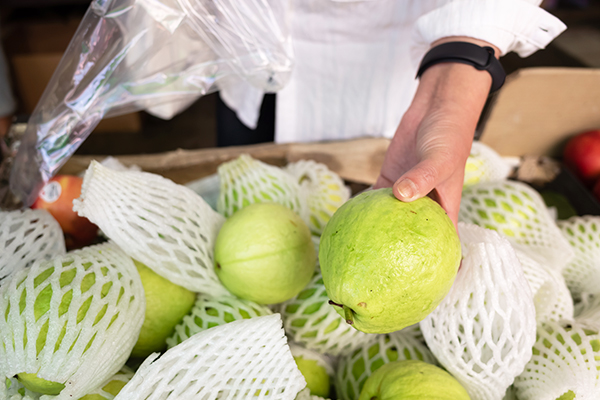
When selecting your fruit at the store, check that it is free of any cuts or bruises. Also, be sure to give your fruit a sniff before putting it in your basket. You can often tell good guavas by their smell, even before they are ripe. Select guava that has a strong, fruity aroma.
If you are anxious for green guava to ripen, you can place it in a paper bag with an apple or banana. This will accelerate the ripening process. If the guava is not ripe yet, it should be stored at room temperature for up to 6 days. Ripe fruit should be stored in the refrigerator for up to 10 days.
Although guavas can be stored in the fridge for longer preservation, they taste best if eaten as soon as they are ripe.
How Are Guavas Grown and Harvested?
Perennial fruits, such as guava, are loved by gardeners and farmers because they can produce for many years without being replanted. Guava plants live for around 40 years!
Usually, plants will start bearing fruit at 2 years and are heavy producers by age 8. Under proper conditions, a tree can be ready for harvest two times per year.
Production and season depend on the specific variety. In tropical regions, guavas are grown and harvested year-round. For local customers, farmers allow the fruit to ripen on the trees, which have the most natural and powerful flavor.
Since guavas continue to ripen after being picked, they do not need to be sprayed with chemicals and pesticides for preservation. The fruit can be harvested early and naturally ripens by the time it reaches your kitchen shelf – no preservatives are needed.
Cautions and Considerations
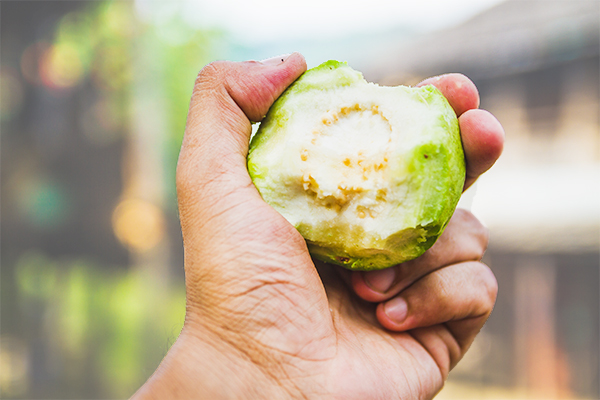
Guava is a healthy food that can be included in most diets. However, it may not be the right food for everyone. Take the following into consideration before adding guava to your diet.
Can guava cause an allergy?
Guava should be avoided by those who are allergic to it to prevent possibly fatal reactions. Reactions can be mild or severe, depending on the individual’s sensitivity, portion size, and duration of exposure.
Although allergies to guava are possible, they are not common. Guava is naturally low in histamine, a compound made by the body during inflammatory and allergic reactions.
Some individuals that suffer from inflammatory diseases such as allergies, lupus, eczema, and digestive issues follow a “histamine-free” diet. Guava can usually be included in this meal plan.
Is it safe to eat guava if you have diabetes?
Guava is low on the glycemic index. However, the peel has been shown to increase blood sugar. Results of an animal study suggested that people with diabetes should remove the peel from guava before eating. (15)
Is fructose good for you?
Fructose is a naturally occurring sugar found in fruits and vegetables and is healthy so long as it is eaten as part of these foods. However, it is also used to make high-fructose corn syrup, which is an ingredient of many processed foods, including soda and candy.
These foods are associated with an increased risk of diabetes, obesity, and other chronic diseases. High-fructose corn syrup is likely related to these diseases because it is easily overconsumed and contributes to excess weight gain.
Can guava make you feel bloated?
Guavas are high in fiber and fructose, which are fermented by the bacteria in the gut. As the bacteria feast on fiber and fructose, they produce gas. This can make you feel bloated and gassy.
Is guava keto safe?
The ketogenic diet is not nutritionally adequate due to the exclusion of most fruits and vegetables, which are high in carbohydrates.
Compared with other fruits, guava is low in net carbs due to its high fiber content. Guava can contribute the needed vitamins and minerals to a ketogenic diet.
Drug Interaction
High levels of vitamin C may interact with medications. One serving of guava contains over 200% of the daily value of vitamin C.
Practice caution when adding guava to your diet if you take any of these medications:
- Digoxin
- Fexofenadine
- Indinavir
- Vincristine
- Colchicine
- Topotecan
- Paclitaxel
Expert Answers (Q&A)
Answered by Ms. Brocha Soloff, RD
Guava is a high-fiber fruit that can help manage blood sugar levels when eaten in moderation.
Eating fruits in excess can cause weight gain due to the high quantities of sugar and total calories in them. If you are trying to lose weight, consume fruits, including guavas, in moderation.
Guava seeds are best avoided, as guava seeds can, on rare occasions, cause appendicitis if they get stuck in the appendix.
Guava, when eaten in conjunction with an overall healthy balanced diet, can help manage blood sugar levels, promote weight maintenance, and even aid in weight loss when combined with caloric restriction.
Guava on an empty stomach is great because it is refreshing and healthy to start your day with a fruit that contains fibers to fill you up and carbohydrates to give you energy for the day.
About Ms. Brocha Soloff, RD: Brocha is a registered dietitian, certified personal trainer, and group fitness instructor. She is currently a dietitian at the Excelsior Care Group and resides in the Greater New York City area.
Final Word
Guava can be enjoyed in its simplicity or prepared into an intricate dish. It is packed with nutrients that contribute to its many touted health benefits. Many of its acclaimed benefits have not been fully researched, but there is no arguing that this delicious fruit can be a nutritious addition to a healthy diet.
- Was this article helpful?
- YES, THANKS!NOT REALLY


